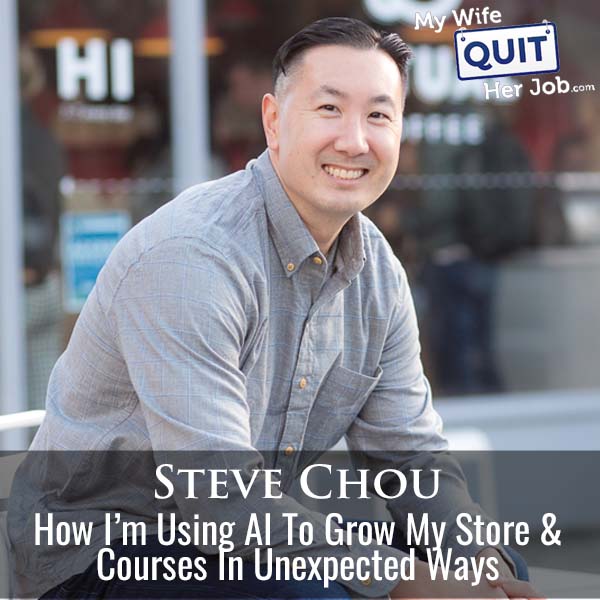602: How I’m Using AI To Grow My Store And Courses In Unexpected Ways

E-commerce Entrepreneur Leverages AI to Boost Online Sales
Steve Chou, founder of MyWifeQuitHerJob.com and Bumble Bee Linens, has implemented artificial intelligence (AI) tools to enhance the customer experience and drive revenue growth for his online store. Chou details how AI is being used to improve product discovery, personalize recommendations, and refine on-site search functionality, resulting in a reported initial sales lift of 18% for one particular feature. This innovative approach highlights the growing importance of AI in e-commerce for businesses of all sizes.
AI-Powered Product Recommendations
Chou's primary focus has been on improving product recommendations. Drawing inspiration from Amazon's "frequently bought together" feature, he sought to implement a similar system on Bumble Bee Linens. However, with nearly a thousand SKUs, many products lacked sufficient sales data to generate accurate recommendations. Using AI, Chou was able to analyze sales data and identify items that are statistically likely to be purchased together. He used a Python library called FP Growth to achieve this. This system then displays these related items on product pages, encouraging customers to add more items to their carts.
To address the lack of data for less popular products, Chou employed AI to analyze product images and generate a list of similar items. This ensures that even niche products have associated recommendations, improving product discoverability and potentially increasing sales. "You can feed it an image and then generate, like turn the image into math and then compare that image with every single product on your site and find the most similar ones," Chou stated.
Refining the "Add to Cart" Experience
Chou also enhanced the "add to cart" pop-up on Bumble Bee Linens. Previously, this pop-up displayed random products, but it now incorporates a combination of frequently bought together items and similar products identified by AI. This targeted approach has reportedly doubled the effectiveness of the pop-up, leading to increased sales conversions.
AI-Driven On-Site Search Optimization
Recognizing the importance of effective on-site search, Chou tackled the issue of poor search results. Historically, a significant percentage of searches on Bumble Bee Linens yielded zero results, often due to misspellings and the use of synonyms. To address this, Chou used AI to generate detailed descriptions of each product, including potential use cases and target audiences. These descriptions were then indexed using a vector database, allowing the search engine to understand the intent behind user queries and return more relevant results, even with misspellings or imprecise language.
"What I did was I had AI generate very detailed descriptions of all of my products. So it took the photo and described every aspect of that product based on the photo," Chou explained. "I had it spit out every possible occasion that that product could be used for. Every type of person that be looking for it, a whole bunch of things, right? And then I fed that into, I turned that into math with a vector database. And then now when someone queries, that queries that description and returns the closest possible thing."
Expert Perspective: The Broader Impact of AI in E-commerce
Dr. Emily Carter, a professor of e-commerce at the University of Technology, emphasizes the transformative potential of AI in the retail sector. "AI is no longer a futuristic concept; it's a present-day necessity for e-commerce businesses looking to stay competitive," Dr. Carter explains. "By leveraging AI for product recommendations and search optimization, companies can create more personalized and engaging shopping experiences, ultimately driving sales and building customer loyalty."
However, Dr. Carter cautions against over-reliance on AI. "While AI can provide valuable insights and automate certain tasks, it's crucial to maintain a human element in the customer experience," she says. "Businesses should use AI to augment, not replace, human interaction."
The Evolution of E-commerce and the Role of Technology
The e-commerce landscape has undergone a dramatic transformation since its inception. Early online stores relied on basic product listings and limited search functionality. As technology advanced, e-commerce platforms incorporated features like customer reviews, personalized recommendations, and sophisticated search algorithms. The rise of AI represents the next major evolution, enabling businesses to provide even more personalized and efficient shopping experiences.
The implementation of AI in e-commerce, as demonstrated by Chou's experience, underscores the importance of continuous innovation and adaptation in the digital marketplace. While the initial results are promising, Chou acknowledges that the long-term impact remains to be seen. He plans to monitor the performance of these AI-powered features and make adjustments as needed. He also cautioned against expecting the initial lift to be consistent, noting that the lift will most likely level out over time.
Looking Ahead
As AI technology continues to evolve, its role in e-commerce is likely to expand even further. Businesses can expect to see AI-powered solutions for tasks such as inventory management, fraud detection, and customer service. By embracing AI, e-commerce entrepreneurs can unlock new opportunities for growth and create more compelling shopping experiences for their customers.
Originally sourced from: WifeQuitHer Job
